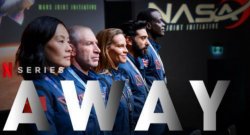
Review by Peter Shea
September 14, 2020
Plato’s Republic started the genre of utopian fiction, asking its Greek audience how they would arrange things differently, if they could leave their sad history behind and start over. The question kept being asked, in many utopias since. In our own time, writers conjure up colonies in space and international cooperative ventures. Can human beings grow beyond their rivalries and prejudices? Can a new kind of human being emerge, as people adapt to different challenges? Such questions pressed in on Athenians after the Peloponnesian War. Later, similar questions provoked the golden age of science fiction after World War II. The Netflix series Away joins this conversation, with assured story-telling and technical sparkle learned from decades of sci-fi film-making. Watching it prompts thought and imagination and new feelings. It re-animates Plato’s questions. Consider two examples.
How much can we concentrate and specialize, without losing our humanity?
Some people care absolutely – about more than one thing. In the Netflix series Away, most of the crew on the first ship to Mars have strong family and friendship connections on earth. Thanks to (implausibly) good phone connections, they can stay involved in dramas on earth as they face crises on the ship. When crises happen both places at once, they are stretched to breaking.
When Plato builds his model city in Republic, he builds to exclude this kind of conflict, altogether. The rulers and other guardians give up their children to nurses, and so never know their own children. Their friends are colleagues. Leaders can, therefore, concentrate. Plato saves the leaders from the grief and strain of having two goals and two lives through structures and rules that simplify their field of vision, allowing them to concentrate very hard on what they do best.
The set-up in Away recalls the model city in another way, also. The ship is supported by a ground control operation, and the ground control people are, in principle, in charge. But, given communication lags, and the velocity of crises, the crew often makes decisions without direction from earth. Again, Plato separates what Alive joins: in Plato’s fantasy, the deliberative and directing intelligence is isolated from those who carry out orders. That’s the way ground control is supposed to exercise control, but it is clear that such division of labor will not work for a project like space exploration. Crew members on a ship between planets must combine qualities that Plato imagines as best separated.
It is never clear, in Republic, whether Plato is recommending such a compartmentalized vision of humanity or simply asking his students and other readers (from Athens, and also other Greek cities) to think about how it would work to encourage such specialization, concentration, and self-limitation. One is prompted to ask two questions. Would this specialized approach work better for tasks (winning wars, going to Mars, running a government)? Also, would a life concentrated and subdivided in this way be good for human beings – or worthy of human beings?
Can any country plausibly build a wall around its way of life?
Plato’s model city is structured to maintain itself, free from civil unrest and foreign domination, prosperous and efficient over a long time. There’s no hint in the set-up of any intoxication with adventure or expansion or novelty. The allure of empire has faded. What’s important: maintaining structures that work and bordering the city off against foreign influence and pressure.
The starting point for Away is an international space mission: adversaries have combined resources and contributed their best people to an all-star crew whose different cultural habits and deep expertise must be integrated into one working team. At the pre-launch press conference, the commander gets the question: could this money could be better spent solving domestic problems? Her answer: the mission is an effort to give rival countries (and humanity as a whole) a goal that goes beyond local power struggles, beyond the arms race, beyond nationalism. Unless human beings can unite on some such project or ideal, nobody’s prosperity will be safe for long.
In the model city discussion, Plato imagines that a small city that limited its visible, stealable wealth and fielded a fierce army could preserve its integrity among bigger players through strategic alliances and calculated ruthlessness. He imagines that there is a way of solving the city’s problem without solving the problems of relationships in an entire region. Away rejects that idea
The relevance of Away for young people now
Away connects to the experience of many people, especially children, who have multiple strong commitments or who are dependent on people with such commitments. I remember a conservative rabbi, Manis Friedman, explaining in an interview that, for him, family came first. He worked so that he could live life in his family. There was no conflict. Some families are like that. In many others, parents are constantly making trade-offs between their passionate professional commitments and their places as parents and spouses and family members. Children, watching that conflict over time, might decide not to have children, or might decide to opt for a marriage in which one parent is primarily a caregiver and the other acts more like a visiting uncle. It is hard to imagine how to proceed, day after day, caring intensely about two different things. The question, ‘What is possible, in a sane human life?’ is worth opening up. Away plays fair with the question: the astronauts’ passionate professional commitments enrich all their relations, and they charge a steep fee: lost opportunities, missed appointments, absence. The Mars mission is away from Earth for three years.
Children grow up knowing about different cultures, and beset by messages about how to think about difference, ranging from “Our sort are the best, and we should put up with everybody else” to “We are really all the same, underneath” to “We are dangerously different and any interaction may turn into a trap, without warning”. They don’t need more preaching, in any of these modes. It might be helpful, though, for them to see a multi-cultural group try to work things out over time. Away tries to show the perils and the promise, balanced, of working across cultural divides. It starts that discussion, also.
Philosophy has always been about bringing fresh air into stale discussions, inviting people to look beyond national boundaries, beyond the immediate facts of daily life, to imagine various futures. Some rare stories of adventure and heroism are animated by an ideal of human progress that’s more than a hymn to nationalism, more than a rehash of old projects. Star Trek started kids off thinking new ways, with multi-racial crews, equality of the sexes, an ideal of exploration that put science ahead of conquest. Away is a worthy grandchild of that project.
